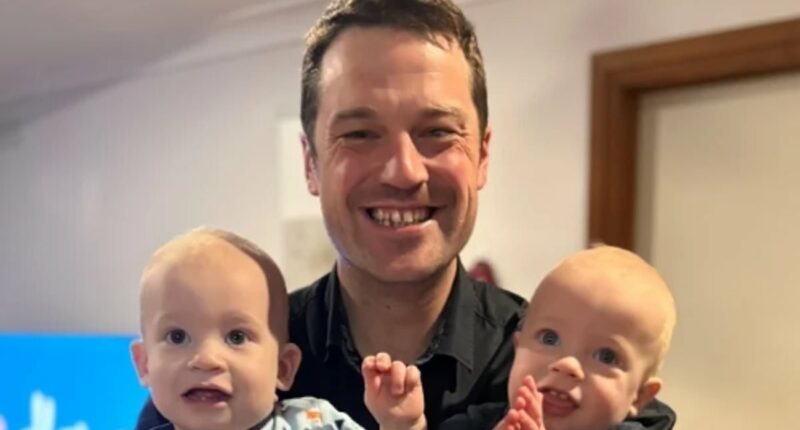Share this @internewscast.com
Luke Mac vividly remembers the day he learned he was going to become a father – a moment filled with excitement and hope.
He and his wife Renee were thrilled to announce they were expecting a baby boy, sharing their joy with family and friends.
‘I’ve always wanted to be a dad. I was genuinely excited,’ the 31-year-old musician from Wodonga, Victoria, told Daily Mail.
Luke immersed himself in getting ready for fatherhood, diving into books and gaining insights on what to anticipate. Their journey into parenthood started off effortlessly—their first son was so easygoing that they humorously predicted future siblings would be more challenging.
Then came the news: they were expecting twins. And when the babies arrived last May, Luke’s mental health took a sudden turn.
He started feeling overwhelmed, losing his sense of self, and becoming solely ‘just a dad,’ which distanced him from his creative side that he regarded as vital to his identity.
‘I’ve been a musician for ten years, but going from one child to three overnight left us outnumbered – with almost no time for ourselves,’ Luke said.
Luke’s struggles began when raising three children became his sole focus, leaving little room for anything else.

Luke Mac (pictured) and his wife Renee were thrilled to hear they were having twins, but when they were born, Luke’s mental health took a turn
Days swiftly merged into one another. For several months, Luke unknowingly battled postnatal depression, suppressing his emotions and confiding in no one, not even Renee.
Sleep-deprived, burnt out, and carrying the mental load of a young family, he felt overwhelmed.
‘The jump from one to three kids was huge,’ he said.
‘I struggled to enjoy anything. I’m a huge movie and video game enthusiast, but everything felt dull. I couldn’t read; I couldn’t engage in anything. There was just this mental block.’
‘There were multiple times where I was just curled up on the floor in tears, for no apparent reason besides being overwhelmed. My wife had no idea.’
Luke often concealed his emotions, shedding tears alone when Renee was away or asleep. If she checked on him, he’d always say, ‘I’m fine,’ and came up with an excuse.
He was caught in a cycle of guilt and self-doubt, asking himself: ‘Am I doing enough?’
‘I felt my emotions were unwarranted. My wife carried and birthed two children, going through all the hormonal and physical changes. What have I really done?’ he wondered.

Trent Gallucci also knows the struggle of becoming a new dad and coping with postnatal depression having felt ‘like a failure’ after welcoming his son Xavier four years ago
‘I was consistently pulling myself down and putting pressure on myself to do more. I kept thinking: ‘Who am I to feel this way?’
The couple received little assistance from the government, adding financial strain. Services Australia states the Multiple Birth Allowance ‘is not for people who have twins in their care’, only triplets, quadruplets or more.
‘It’s double the pressure with no added support,’ Luke said.
One night, lying in bed next to Renee, Luke reached a breaking point, paralysed by fear of speaking about his emotions.
‘I was lying there frozen and everything I wanted to say was running through my head. My wife is my most trusted ally, I should be able to communicate and talk to her about it. But I was physically incapable of opening my mouth,’ Luke said.
‘I had done some research and learned what I was experiencing was normal, which I had no idea of up until that point, but I couldn’t say anything. It was a really scary experience, traumatic even. I still can’t fathom it today.’
Unable to voice his feelings face to face, Luke sent Renee a text the next day. He told her everything he’d been feeling.
‘I said how I was struggling and there was something preventing me from speaking about it but I didn’t know why. It was like breaking down the walls then she approached me to talk about it,’ he said.
‘When we spoke about it in person I was still pulled back and didn’t cry but I was able to talk about it as a matter of fact.’
By opening up, Luke felt the stress lift. He and Renee prioritised time for their own pursuits. Luke returned to music, performing shows and writing – slowly reconnecting with himself.
Looking ahead, Luke is determined to teach his sons to be open about their feelings.
‘Your partner is your support network as much as you’re theirs. So be willing, be open, have those conversations. As much as society has deemed men have to be strong and not talk about emotions, it doesn’t have to be that way. It shouldn’t be,’ he said.
‘As a father of three boys, this is something that’s so important to me now – being able to express your emotions.’
Trent Gallucci knows all too well the struggle of new fatherhood and postnatal depression, having felt ‘like a failure’ after welcoming his son Xavier four years earlier.
The 30-year-old, from Sydney, and his wife Stella began trying for a baby in 2020 while living in New Zealand, but faced a difficult road. Stella was diagnosed with polycystic ovary syndrome (PCOS), with doctors telling them their chances of conceiving were slim.
Against the odds, Stella fell pregnant in January 2021, and the pair were ‘absolutely ecstatic’. The pregnancy was routine until 30 weeks, when Stella sensed something was wrong.
‘I got home from work and Stella said to me: “Oh, the baby… he’s not moving around as much. I don’t know what’s happening. Can we just go to the hospital and get checked out?”‘
Thinking the baby might just be sleeping, they stayed in hospital overnight. The next morning, after another ultrasound, the news came suddenly.
‘[The doctor] said, “Look, we’ve reviewed all the data. Unfortunately, we just don’t know what’s happening, so the best thing to do is to get him out. Get yourselves ready. You’ll be in theatre in four hours with a new baby.”‘
Xavier’s early arrival, ten weeks before his due date, left the couple unprepared – they had no car seat, cot or bassinet at home.
‘I went through the full range of emotions; I was excited and happy but bawling my eyes out crying at the same time,’ Trent said.
Doctors warned them about the risks of prematurity, from delayed development to cerebral palsy, but everything moved quickly and soon they were in theatre.
‘All I wanted to do was stay with my wife because she was still on the operating table but they were dragging me away to be with Xavier to clean him up. It felt a little bit like I was caught in no-man’s land. I didn’t know which way to go, I was stuck in the middle,’ Trent said.
The couple spent a week recovering in hospital. Xavier remained in the neonatal intensive care unit (NICU) for ten weeks, until his original due date. During that time, Trent was confronted by heartbreaking realities.
‘We learnt that there were two babies [in the ward] who had chronic lung issues – they were only about 20 and 28 weeks old. One of them had already had about three or four surgeries. There was another baby who unfortunately didn’t make it. It was just rough to be there,’ Trent recalled.
‘At the same time, we felt so lucky.’
Leaving hospital without Xavier was ‘awful’. Trent felt a deep sense of failure.
‘I felt like I failed my family because I wasn’t able to bring him home or be there the whole time. I just completely collapsed in on myself,’ he said.
Visiting Xavier was strictly limited, and COVID restrictions meant little family support. Trent didn’t realise he was suffering postnatal depression until much later.
When they finally brought Xavier home, his emotions spiralled.
‘Being new parents in our mid-20s, we had no idea how to take care of a child. We were clueless and in the deep end,’ he said.
‘Up until the day of discharge, he had a nasogastric tube in his nose to help him feed. So he couldn’t breastfeed and eventually took the bottle.
‘We were on a very strict feeding regime too because he was underweight and he had to be fed at a certain time.’
Trent lost enjoyment in his former passions, like playing drums. Fatigue took over.
‘I’d go and sit behind the drum kit and start to play. Then after about two minutes, I’d be like, you know, it’s just not even worth it. I’m just not feeling anything.’
Complex emotions persisted for weeks. One day, holding Xavier, Trent reached his lowest point.
‘I remember thinking, “I’m holding the miracle of life in my hands, and it’s amazing, but why am I not happy? Why don’t I feel that unconditional love that every parent should do when they’re holding their child?”‘
He kept his feelings from Stella, convinced he had to be the family’s rock.
One day, while cleaning the nappy bag, he found a pamphlet for Gidget Foundation Australia, a support service for new parents struggling with perinatal anxiety and depression.
He booked an appointment to speak to someone and, that night, finally told Stella.
‘I just couldn’t hide it anymore and I was really suffering. I wasn’t happy with our situation. So after Xavier was in bed and we were relaxing, I told her that I had made an appointment in a week to speak to someone,’ Trent recalled.
‘I felt selfish not telling her up until that point – then I learned she was struggling, too.’
During his first session, Trent shared his story for the first time.
‘In the first couple of minutes I just lost it and burst out crying. All the emotions that I packed up came out in one and were laid on the table. As rough as that was, it was the best thing for me,’ he said.
He went on to have 14 sessions with the psychologist.
Looking back now, Trent says the experience helped him work through his emotions – and prepared him for the birth of his second son, Matteo.

About one in 10 new dads experience perinatal depression or anxiety in the months before or after the birth of their baby (Trent and Stella are pictured with Xavier and Matteo)
About one in 10 new dads experience perinatal depression or anxiety in the months before or after the birth of their baby.
Mathew Aquilina, Clinical Team Manager at Gidget Foundation Australia, revealed the signs to look out for and what to do if you’re suffering.
‘While some symptoms overlap with mothers, many dads experience depression differently, often presenting as irritability, anger, or emotional detachment,’ he said.
‘It’s important to recognise that men and non-birthing partners can also experience significant distress during the perinatal period, even if it doesn’t fit conventional expectations.
‘Fathers should be aware of signs and symptoms of perinatal depression and anxiety, particularly if they are struggling with their mental health. These include feeling persistently low, overwhelmed, anxious, or unusually irritable for more than two weeks.’
Dads may lose interest in things they once enjoyed, feel disconnected from their partner or baby, or struggle with motivation. Other indicators include sleep issues unrelated to the baby, difficulty concentrating, or unexplained physical aches.
One of the greatest barriers for fathers is stigma. Only 12.9 per cent of Australian men seek professional support for their mental health, compared with 21.6 per cent of women, according to the Australian Bureau of Statistics.
‘While community awareness has improved, cultural and generational expectations that men should suppress emotions persist,’ he added.
‘Challenging these views requires open discussion and reassurance that seeking help is not a sign of weakness but of strength. Importantly, acknowledging that something feels wrong is often the most powerful first step toward recovery.’













